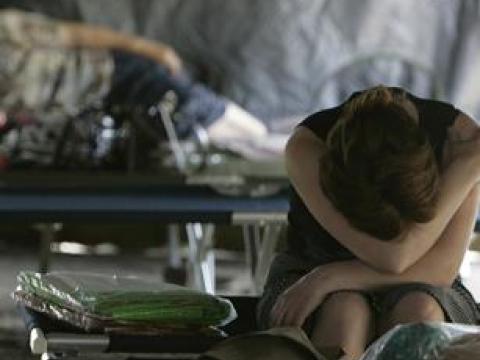Georgia’s displaced may be unable to return for months, World Vision warns

“Once winter comes, it is likely the roads will be blocked and the weather conditions too extreme for displaced families to return to their communities,” said Ashley Clements, World Vision’s emergency advocacy advisor. “So if people are not able to go home before winter, they will be forced to remain in displacement centres for months. As a result, World Vision’s emergency response may need to last as long as a year.”
Children in some Georgia shelters are sleeping on bare concrete because these abandoned buildings lack bedding and other basics Landmines laid during the recent conflict also pose a threat to those wishing to return home, especially children, and hinder full humanitarian access to some areas. For people who are able to return to their communities, damaged infrastructure may prevent a return to normal livelihoods. Those who stay in Georgia must endure life in displacement shelters, many of which lack running water, heat, electricity and windows.
“Children in some Georgia shelters are sleeping on bare concrete because these abandoned buildings lack bedding and other basics,” Clements said. “World Vision will be providing mattresses to help, as well as continuing our distributions of food, hygiene kits and other basic necessities.”
Meanwhile, World Vision staff who visited Gori this week found that the population had received little humanitarian assistance, particularly people in villages outside of the city. Earlier this week, the organisation was able to provide its first food and emergency supplies to 1,000 residents of Gori and plans to increase distributions to the hard-hit city, along with more isolated families in surrounding villages.
World Vision is planning Child-Friendly Spaces to offer them a safe place to play and regain a sense of normalcy Even families not directly displaced have been economically impacted by the crisis, World Vision has found. Poor entrepreneurs in Georgia who receive small loans through the agency’s microfinance program, for example, have found it difficult to buy supplies and to sell their finished products because of blocked roads and lack of access to markets further afield.
To address the specific needs of displaced children in Georgia and North Ossetia, World Vision is planning Child-Friendly Spaces to offer them a safe place to play and regain a sense of normalcy, as well as talk with trained counselors about what they have experienced. In Tbilisi, the organisation is also addressing the special needs of pregnant and nursing women and their infants who have been forced to flee the violence.
As a leading relief and development agency in Georgia, World Vision is appealing for US$4.2 million for its response and plans to assist 45,000 displaced people in Georgia—along with additional families in North Ossetia.
-Ends-
Children in some Georgia shelters are sleeping on bare concrete because these abandoned buildings lack bedding and other basics Landmines laid during the recent conflict also pose a threat to those wishing to return home, especially children, and hinder full humanitarian access to some areas. For people who are able to return to their communities, damaged infrastructure may prevent a return to normal livelihoods. Those who stay in Georgia must endure life in displacement shelters, many of which lack running water, heat, electricity and windows.
“Children in some Georgia shelters are sleeping on bare concrete because these abandoned buildings lack bedding and other basics,” Clements said. “World Vision will be providing mattresses to help, as well as continuing our distributions of food, hygiene kits and other basic necessities.”
Meanwhile, World Vision staff who visited Gori this week found that the population had received little humanitarian assistance, particularly people in villages outside of the city. Earlier this week, the organisation was able to provide its first food and emergency supplies to 1,000 residents of Gori and plans to increase distributions to the hard-hit city, along with more isolated families in surrounding villages.
World Vision is planning Child-Friendly Spaces to offer them a safe place to play and regain a sense of normalcy Even families not directly displaced have been economically impacted by the crisis, World Vision has found. Poor entrepreneurs in Georgia who receive small loans through the agency’s microfinance program, for example, have found it difficult to buy supplies and to sell their finished products because of blocked roads and lack of access to markets further afield.
To address the specific needs of displaced children in Georgia and North Ossetia, World Vision is planning Child-Friendly Spaces to offer them a safe place to play and regain a sense of normalcy, as well as talk with trained counselors about what they have experienced. In Tbilisi, the organisation is also addressing the special needs of pregnant and nursing women and their infants who have been forced to flee the violence.
As a leading relief and development agency in Georgia, World Vision is appealing for US$4.2 million for its response and plans to assist 45,000 displaced people in Georgia—along with additional families in North Ossetia.
-Ends-
Share